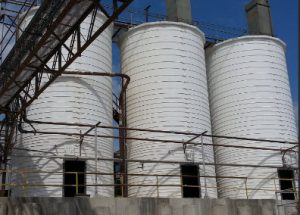Silo Structural Inspection – Structural Engineers
Silo Structural Inspections & Engineering, Inspection & Forensic Analysis of Grain and Material Silos in Palm Beach & Fort Lauderdale, Florida
Professional Silo Structural Inspection for Silos and Bulk Storage Structures
At SB-4D, we provide licensed structural inspections for silos—including grain silos, feed silos, concrete towers, and steel hoppers—throughout Palm Beach, Fort Lauderdale, and all of South Florida.
Our engineers apply advanced Finite Element Analysis (FEA), field testing, and visual inspection to ensure your silos are structurally sound, safe, and compliant with the Florida Building Code (FBC), ACI 313, ACI 318, and IBC 2024.
We inspect agricultural silos, cement silos, bulk material hoppers, and storage bins for farms, ports, and industrial facilities.
What Is a Silo Structural Inspection?
A silo structural inspection evaluates the load-bearing performance and safety of the silo walls, roof, foundation, and discharge areas under static and dynamic loads.
Our engineers assess:
-
Concrete or steel shell cracking, spalling, or corrosion
-
Buckling, ovalization, or deformation
-
Foundation settlement and differential movement
-
Roof trusses, ring beams, and tension collars
-
Internal liners and load distribution from stored material
-
Wind and seismic effects based on local site conditions
Our Structural Inspection Process
Phase 1 – Visual and Non-Destructive Inspection
-
On-site evaluation of visible structural elements
-
Ultrasonic thickness measurement for steel silos
-
Concrete integrity and corrosion mapping
-
Drone inspection for inaccessible heights
Phase 2 – Analytical and FEA Modeling
If issues are detected, we perform detailed analysis:
-
Finite Element Modeling (FEA) of silo wall and hopper geometry
-
Load pressure simulation for grain, cement, or feed
-
Verification of hoop stresses, membrane forces, and shell buckling
-
Deflection, uplift, and vibration response analysis
All inspections comply with ACI 313 – Design of Concrete Silos and Stacking Structures and FBC Section 2209 for metal storage structures.

Deliverables
✅ Engineer-sealed report (FBC and ACI-compliant)
✅ Photographic documentation of defects
✅ FEA-based verification results
✅ Repair and retrofit recommendations
✅ Certification letter for permitting or insurance
Why Choose Structural Engineers for Silo Structural Inspections
-
30+ years of forensic and structural engineering expertise
-
Florida-licensed professional engineers (PEs)
-
Specialists in coastal wind, corrosion, and hurricane exposure
-
Rapid turnaround and same-day preliminary findings
-
Full compliance with Florida Building Code, IBC, and OSHA standards
Common Issues Found in Silo Structural Inspections
-
Cracking or delamination in concrete silos
-
Steel corrosion, pitting, or loss of section
-
Roof truss fatigue or joint failure
-
Hopper buckling due to eccentric flow
-
Settlement of foundations or annular slabs
-
Moisture intrusion and chloride attack
FAQs – Silo Structural Inspection
1️⃣ How often should a silo be inspected?
At least every 3–5 years, or after major storms, overloading, or structural modifications.
2️⃣ What standards are used for design and inspection?
We follow ACI 313, ACI 318, AISC 360, and the Florida Building Code.
3️⃣ Can SB-4D inspect both concrete and steel silos?
Yes — we handle all silo materials including concrete, steel, aluminum, and hybrid systems.
4️⃣ Can you provide load rating and retrofit design?
Absolutely. Our FEA-based analysis calculates actual load capacities and retrofit requirements.
5️⃣ Do you service industrial or agricultural clients?
Both. We work with farms, feed mills, cement plants, ports, and bulk terminals.
Contact SB-4D
For expert Silo Structural Inspections or Finite Element Analysis of grain, feed, or cement silos:
📞 561-371-6102
📧 info@sb-4d.com
URL https://SB-4D.com
